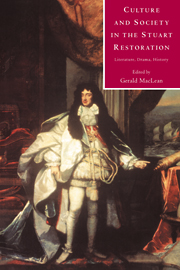Book contents
- Frontmatter
- Contents
- Notes on contributors
- Acknowledgments
- Abbreviations and note on the text
- INTRODUCTION
- PART I DRAMA AND POLITICS
- PART II AUTHORSHIP AND AUTHORITY
- 5 Pepys and the private parts of monarchy
- 6 Milton, Samson Agonistes, and the Restoration
- 7 Milton, Dryden, and the politics of literary controversy
- 8 “Is he like other men?” The meaning of the Principia Mathematica, and the author as idol
- PART III WOMEN AND WRITING
- PART IV EMPIRE AND AFTERMATHS
- Index
7 - Milton, Dryden, and the politics of literary controversy
Published online by Cambridge University Press: 20 August 2009
- Frontmatter
- Contents
- Notes on contributors
- Acknowledgments
- Abbreviations and note on the text
- INTRODUCTION
- PART I DRAMA AND POLITICS
- PART II AUTHORSHIP AND AUTHORITY
- 5 Pepys and the private parts of monarchy
- 6 Milton, Samson Agonistes, and the Restoration
- 7 Milton, Dryden, and the politics of literary controversy
- 8 “Is he like other men?” The meaning of the Principia Mathematica, and the author as idol
- PART III WOMEN AND WRITING
- PART IV EMPIRE AND AFTERMATHS
- Index
Summary
Questions of influence – of imitation and adaptation, of pedagogy and admiration – exercise a steady interest for students of literary relations; they seem especially appropriate when posed to relations among writers who were contemporaries, perhaps acquaintances or friends, intimates or collaborators: Eliot and Pound, Ford and Conrad, Coleridge and Wordsworth, Swift and Pope, Milton and Dryden. But recent work on the relations between authors and among texts has so complicated our notion of influence that the word itself seems slightly worn. Indeed, the idea of influence has come to imply models of acquisition and contest that subsume and all but exclude imitation and admiration. Without denying the older language I want here to consider “contest” as the shadow under which negotiations between Milton and Dryden took place, to suggest that while adaptation and admiration describe aspects of Dryden's encounter with Milton – surely admiration inflects the lines that Dryden wrote for the frontispiece portrait of the 1688 Paradise Lost – it was contestation, perhaps envy and denial, that rather more powerfully determined Milton's response to Dryden.
Notions of literary dominance and strong writing, perhaps even literary histories of a slightly Whiggish cast, have so long determined our reading of relations between Milton and Dryden that it takes a special effort to imagine the possibility of literary anxiety moving in more than one direction.
- Type
- Chapter
- Information
- Culture and Society in the Stuart RestorationLiterature, Drama, History, pp. 137 - 158Publisher: Cambridge University PressPrint publication year: 1995
- 4
- Cited by



